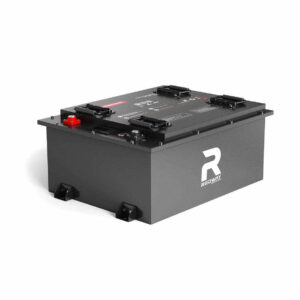What Are the Key Advantages of 48-Volt Systems in Modern Technology?
48-volt systems offer enhanced power efficiency, reduced energy loss, and compatibility with high-demand applications like hybrid vehicles and renewable energy storage. They bridge the gap between traditional 12V systems and high-voltage alternatives, enabling advanced features such as regenerative braking and smart grid integration while maintaining safety and cost-effectiveness.
What Are the Best Types of RV Batteries for Your Needs?
How Do 48-Volt Systems Compare to Traditional 12-Volt Systems?

48-volt systems provide up to four times the power of 12V systems with thinner wiring, reducing weight and energy loss. They support higher electrical loads for advanced automotive tech (e.g., turbochargers, AI-driven sensors) and renewable energy inverters, while operating at safer voltages than 400V+ EV systems. Efficiency gains range from 10-15% in hybrid vehicles.
The reduced wire thickness in 48V architectures cuts copper usage by approximately 60% compared to 12V equivalents, directly impacting manufacturing costs and vehicle weight. In wind turbines, 48V configurations enable more efficient power transfer from nacelle to grid connection points, reducing harmonic distortion by 12-18%. Automotive engineers particularly favor 48V systems for their ability to support 10-15 kW auxiliary loads – critical for next-gen driver-assistance systems requiring real-time data processing.
| Parameter | 12V System | 48V System |
|---|---|---|
| Max Continuous Power | 3 kW | 15 kW |
| Typical Cable Diameter | 25 mm² | 10 mm² |
| Energy Loss over 5m | 18% | 4% |
What Are the Primary Applications of 48-Volt Technology?
Key applications include mild-hybrid vehicles, data center backup power, solar energy storage, and industrial automation. In automotive contexts, 48V systems power electric turbochargers, start-stop systems, and cabin climate controls. For renewables, they optimize battery storage in off-grid solar setups and reduce conversion losses in DC-coupled systems.
What Safety Considerations Apply to 48-Volt Installations?
While safer than high-voltage EV systems, 48V setups require insulated circuit protection, arc-fault detection, and proper grounding. Automotive applications mandate reinforced electrical connectors and moisture-resistant cabling. In renewable installations, NEC Article 720 guidelines apply, including overcurrent protection and isolation monitoring for lithium-ion battery banks.
What You Need to Know About Golf Cart Battery Chargers
How Are 48-Volt Systems Integrated with Renewable Energy Storage?
48V batteries are standard in residential solar systems due to optimal charge controller compatibility. They enable efficient DC-DC conversion for hybrid inverters and reduce transmission losses in off-grid setups. Tesla Powerwall and LG Chem RESU systems use 48V architecture for scalable storage, with peak efficiency of 97% in round-trip energy conversion.
What Are the Prices and Buying Guides for RV Batteries?
What Cost Benefits Do 48-Volt Systems Provide Over High-Voltage Alternatives?
Implementation costs are 30-40% lower than 400V+ systems due to reduced insulation requirements and standardized components. A 48V mild-hybrid system costs automakers $500-$800 versus $2,000+ for full hybrids. In solar installations, 48V battery banks cut balance-of-system costs by 15% through reduced copper use and simplified thermal management.
How Can You Maximize Energy Efficiency With a 3000-Watt Solar System?
The modular nature of 48V architecture allows incremental capacity expansion in solar arrays – users can add 5kWh battery modules at $1,200 each versus $7,000+ for whole-home high-voltage systems. Industrial facilities report 23% lower maintenance costs due to standardized 48V components availability. A recent DOE study showed data centers using 48V UPS systems achieved 14% better energy utilization effectiveness (EUE) compared to 480V configurations.
| Application | 48V System Cost | High-Voltage Alternative |
|---|---|---|
| Automotive Hybrid | $650 | $2,300 |
| 10kWh Solar Storage | $4,200 | $6,800 |
| Industrial Robot | $1,150 | $3,400 |
Which Industries Are Rapidly Adopting 48-Volt Architecture?
Automotive leaders like Audi (MHEV), Ford (F-150 Hybrid), and Continental (eTurbo) use 48V systems. Energy companies like Generac and Tesla employ them in home backup systems. The telecom sector utilizes 48V for 5G tower power, while Amazon uses them in warehouse robots for faster charging versus 24V systems.
What Battery Is Used in Telecom Towers?
“48V is the sweet spot for decarbonization,” says Dr. Elena Torres, Chief Engineer at VoltaTech Systems. “Our testing shows 48V lithium ferrophosphate batteries achieve 6,000+ cycles at 80% depth of discharge – critical for both EV auxiliary systems and microgrids. The real breakthrough is in bidirectional charging; 48V vehicle-to-grid systems can offset home energy costs by 25% without expensive step-down converters.”
Conclusion
48-volt systems are revolutionizing energy management across industries by balancing performance, safety, and cost. From enabling affordable vehicle electrification to optimizing renewable storage, this voltage standard addresses modern power demands while paving the way for scalable smart grid infrastructure.
What Happens If a LiFePO4 Battery Gets Wet? Can Lithium Batteries Get Wet?
FAQ
- Can 48V systems power entire electric vehicles?
- No – they supplement internal combustion engines in mild hybrids but lack the capacity for full EV propulsion.
- Are 48V solar batteries compatible with all inverters?
- Most modern hybrid inverters support 48V input, but legacy models may require additional DC-DC converters.
- How long do 48V lithium batteries typically last?
- 8-12 years in automotive use, 10-15 years in solar storage depending on cycle frequency and temperature control.
